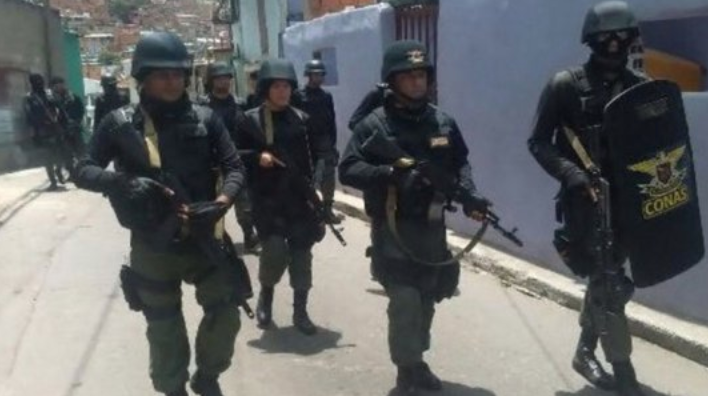Venezuela is one of the most violent countries in the world, with a homicide rate of at leaset 59 for every 100,000 people. In an attempt to stop the dramatic increase in crime and violence, in July 2015 the Maduro government launched Operación Liberación del Pueblo (OLP).
[See more of our coverage here, here, here, and here –ed].
However, the abuses committed by these massive, armed operations, and their ineffectiveness in controlling crime and violence, have raised questions about their appropriateness.
In this article, I gather together the perspectives of a variety of people from low income communities who experience first-hand both criminal violence and violence from the OLP.
In the State of Miranda, close to Barlovento, in a community called Mamporal, Carlos Parra (38) tells me how crime and violence is part of their daily lives. “In this area, lots of bad guys come to hide, and we have always been, as people say, at the mercy of God.” In November, another tragedy was added to the long list of misfortunes this community has experienced–the discovery of twelve cadavers, presumably killed by the Operación Liberación del Pueblo.
The event shook the population, generating a profound sense of dis-ease towards the government’s misguided security policies. Residents now worry not only about criminals and delinquents, but about the police’s unpredictable shows of force.
“Nobody here was surprised to find those kids dead; they had disappeared a while ago. The police and the army are worse than the thugs themselves, and we’re tired of the whole thing. On top of that, the heavy rains produced a landslide and more bodies were discovered. Who knows where they’re from! They’re killing people like flies,” Carlos said, with a tone of sadness. “The fear you have is that they are going to kill you somewhere, in a nasty way, and then say you were a delinquent, on the wrong path.”
José Aguirre (37), who is a friend of Carlos thinks differently.
“I believe the OLP is doing more right than wrong. I live in Carenero where crime was out of control. Sometimes they would even steal the fish you caught. But after that bunch of policemen (i.e the OLP) came, the thugs started to disappear. Now they are scared because they know that when the policemen come, they are not playing around.”
Carlos interrupts immediately: “maybe where you live, because around my place, everything’s the same. Even worse.”
In Caracas, one of the most violent capitals in the world, the OLP do not seem to have had an impact on crime levels. Paula Guevara (64) has lived all her life in “La Cumbre” a sector of Antímano, a large group of barrios in the Southwestern part of Caracas. She described it as always having been a place convulsed by violence, and told how she has seen more murders up close than anyone would care to witness.
“They have killed so many people in front of my house that I have lost count. It has always been like this. Awful.”
Paula recounts the actions taken by the OLP in her neighborhood.
“Look, I’m not going to lie to you. It’s both good and not good for them to be here. On one hand, they are catching those who are doing bad things; but on the other, they sometimes kill good kids. You see how they catch them, take them somewhere and then come back alone. They are not fooling anyone; the policemen are the main thugs.” She whispered nervously, looking to her left and right to make sure nobody was listening.
Even within criminal gangs, perceptions of these extraordinary police operations differ. In a neighborhood of Caracas, which I will not name as requested by the interviewees, I managed to gain access to a house where a gang that carries-out kidnappings and robberies hangs out. They also sell drugs in the area.
For one of the low-ranking members of the gang, the OLP is dangerous. He is worried and very careful, “No man, the OLP is not messing around, I’m selling drugs and I have my eyes wide open because if they catch me, they will kill me.”
However, his boss, who I will call Kevin, does not shows no respect for the police operations. Kevin is over 25 years old, and has been on the streets since he was eleven. When I asked him his opinions on the OLP he laughed shamelessly.
“Why are you laughing? You’re not afraid of the OLP?” I ask.
“Naahh” [no vale], he says with a smile on his face. “When they come, I let them put on their show, because it’s a show. I laugh because when they come, I already know about it, and I hide everything. I basically turn into baby Jesus,”
“How do you know when the OLP are on their way?”
“Brother, money controls everything. It’s a lie that these operations are secret. The guys who get caught are the dumb ones [güevones], who don’t have enough money and get screwed. Since I have been in this for a long time and know how this shit works, I have people on the inside. When they tell me something is ‘highly confidential,’ that just means it’s more expensive.
Kevin finishes by telling me how he knows his business is not going to last forever. At some point, his life will end, as has happened with so many others. But he concludes with irony and a laugh. “As long as things keep going this way, I’m not worried about the Government, I’m more worried about getting sick.”



